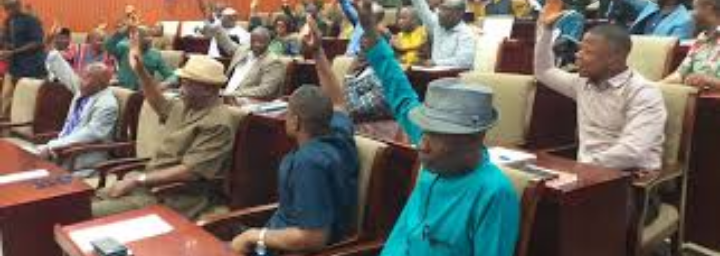House of Representatives Passes Restated Budget in the Tone of US$759M

Capitol Hill, Monrovia – The Honorable House of Representatives has passed and approved the request of Liberia’s President George Weah for a restated budget of US$759.4 million as a result of a US$23 million shortfall.
The House decision came after a four months concurrence with the Liberian Senate in passing a budget of US$ 782.9 million for FY- 2023, which is far short of the US$1 billion mark envisioned by the government.
The decision taken by the House of Representatives came barely 14 days after President George Weah request, in which he noted that there was a need he as a President address some of the economic challenges affecting the nation.
President George Weah in his request, named the confluence of reduction in the volume of trade, expiration of surcharge on petroleum, and reduction of tariff on excise on petroleum as factors that compelled his request, which has submitted the revised budget to provide unforeseen circumstances.
“To ensure that year-end spending is in line with available resources, adjustments in spending entities’ program allocation balances have been made such that the risk is absorbed by all and sundry,” Weah said in a letter to the House as he made the request for recasting. “The realization of the aggregate amount of US$23.5 million has been deemed a risk and untenable. The total adjusted recurrent expenditure is estimated at US$612. 5 million or 80.7 percent of the total proposed expenditure. The revised expenditure estimate for public sector investment is US$146. 8 million or 19.3 percent of the total proposed expenditure.”
The overall fiscal deficit widened to 6.9 percent of GDP in 2022, up from 2.4 percent in 2021, with the increase entirely driven by the primary deficit that rose from 1.5 percent of GDP in 2021 to 6.0 percent in 2022, the World Bank in a new report on the country’s economy disclosed.
According to the Bank, the external grant declined by 3.1 percentage points of GDP, partly reflecting the change in International Development Association (IDA) lending policies for countries at moderate risk of debt distress under IDA20.
In addition, beyond the decline in grants, domestic revenue fell by 1.2 percentage points, reflecting the poor performance of the goods and services tax (GST) and taxes on international trade.
“As Per the expenditure, the provision of subsidies, grants, and social benefits was increased by 1.4 percentage points of GDP to offset the effect of the higher food and fuel prices on the economy and households,” the Bank disclosed.
“Additionally, government consumption spending increased by 0.2 percentage points of GDP to 10.4 percent. The fiscal deficit was mainly financed by concession resources, including the World Bank Group budget support, as well as borrowing from commercial banks”.
Domestic revenue, which had been rising steadily since 2019, declined in 2022, to 15.2 percent of GDP, from 16.4 percent in 2021, the Bank said in its report titled Liberia Economic Update: “Getting Rice Right for Productivity and Poverty Alleviation.
Meanwhile the government expenditures on goods and services increased from 10.2 percent of GDP in 2021 to 10.4 percent while spending on subsidies, transfers, and social benefits increased by 1.4 of GDP to 3.7 percent of GDP and non-tax revenue increased slightly, by 0.2 percentage points, to 2.9 percent of GDP in 2022, albeit 1.0 percentage points lower than expected. Total grants also fell significantly, to 7.8 percent of GDP, from 10.9 percent in 2021, partly a reflection of the change in the IDA lending policy for countries at moderate risk of debt distress under IDA20.
“Consequently, total revenue and grants declined from 27.3 percent of GDP in 2021 to 23.0 percent in 2022. Despite steps to contain the public sector wage bill, total expenditure, and net lending increased slightly from 29.7 percent of GDP in 2021 to 29.9 percent in 2022,” the Bank said in the report.
The report from the assessment of the Country’s recent economic developments is actually intended to help the government of Liberia and its partners developing and identifying issues and addressing challenges faced within the Country.



